With one week to go before the legislative elections, L’Orient-Le Jour takes the pulse of the country through immersive reports from the four corners of Lebanon. Six journalists and three photographers spent time with the inhabitants of different regions to understand how the economic crisis has affected them, and to see how the thawra has affected their mentalities — or not. In eight reports, we will tell the story of Lebanon in Lebanon. Today, in the third episode, we visit Mazraa, a district of Beirut where several Lebanons meet. Sunnis, Greek Orthodox and Shiites often share the same sorrows, but not always the same fears.
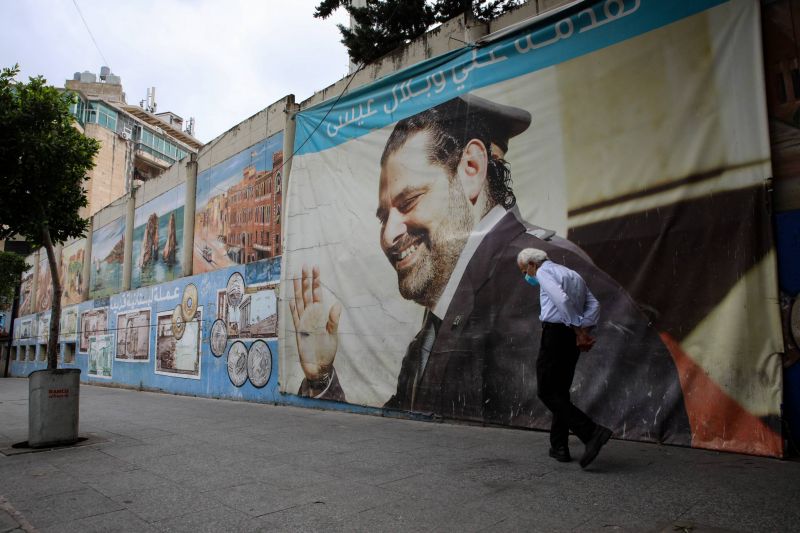
The political withdrawal of Saad Hariri has plunged some 98,000 voters in Mazraa into uncertainty about the next legislative elections.
Sitting on a plastic chair in front of an atayef (pastry) shop in Mazraa, Mohammad has just opened his blue eyes. Out of his pocket, he takes his notes about the electoral lists that are running in the Beirut II constituency, 10 in all, as if it were a soccer team’s ranking for the upcoming games.
Several candidates could please him. Any ‘ibn (son of) Beirut’ or those “offering services, because that’s all the people need.”
However, he will not vote. The withdrawal of his zaim, former Prime Minister Tammam Salam, has been convincing enough for him to abstain. He is far from being the only one. Never before has such ambiguity prevailed on the way this neighborhood of 98,000 registered voters approached the elections.
In this neighborhood in Beirut several Lebanons meet. Sunnis, Greek Orthodox and Shiites, whose number increased after the war, often share the same sufferings, but not always the same fears.
It is despair that holds the reins. All are convinced that nothing will change. They are all angry at the political class. But as soon as you scratch the surface, the “Kellon yaani kellon” (all of them means all of them) slogan of the October 2019 uprising gives way to deep-rooted allegiances, or at least, to strong political preferences.
In this neighborhood, a few weeks before the May parliamentary elections, the rise of the Shiite community and the withdrawal of Saad Hariri from politics are on everyone’s mind.
In every street corner, the flags of the traditional parties are waving in the wind. At first glance, one could say that each party has a base in this neighborhood.
In Basta al-Fawqa, Burj Abi Haidar, in the perpendicular streets of Barbour that lead to Ras al-Nabeh, the Amal Movement’s colors impose themselves on the landscape.
The flag of Ahbash, a pro-Syrian Sunni party, is flying everywhere, mainly in Babour and Noueiri.
Electoral billboards of outgoing MP Fouad Makhzoumi are scattered across the area, except in Tariq al-Jadideh, Hariri’s stronghold. Despite his withdrawal, his photos are still hung.
Hariri’s orphans
The four walls of Mohammad Sammak’s office, a mokhtar (local official) in Tariq al-Jadideh, evoke a nostalgia for a bygone era. Rafik Hariri’s photos are everywhere. “One hundred percent Hariri,” Sammak said.
On his desk, there are stamps that he now buys on the black market. “Everything is [paid for] from our pockets now and we can’t raise the prices too much,” said this father of two daughters, who have US citizenship.
One of them is in the US. The other is finishing her studies at LAU before she joins her sister. A separation forced by the crisis that has plagued Lebanon for more than two years.
Like many voters of the Future Movement, he chose to abstain. “Even if we have 120 MPs, we can’t change anything. There is a pen facing the weapons on the table,” he said, in reference to Hezbollah.
Next to his desk, a map of Tariq al-Jadideh. “Ana ibn el manta’a [I grew up in the neighborhood],” he proudly said. A corner, “that has maintained its Sunni and political identity, unlike the rest of Beirut.”
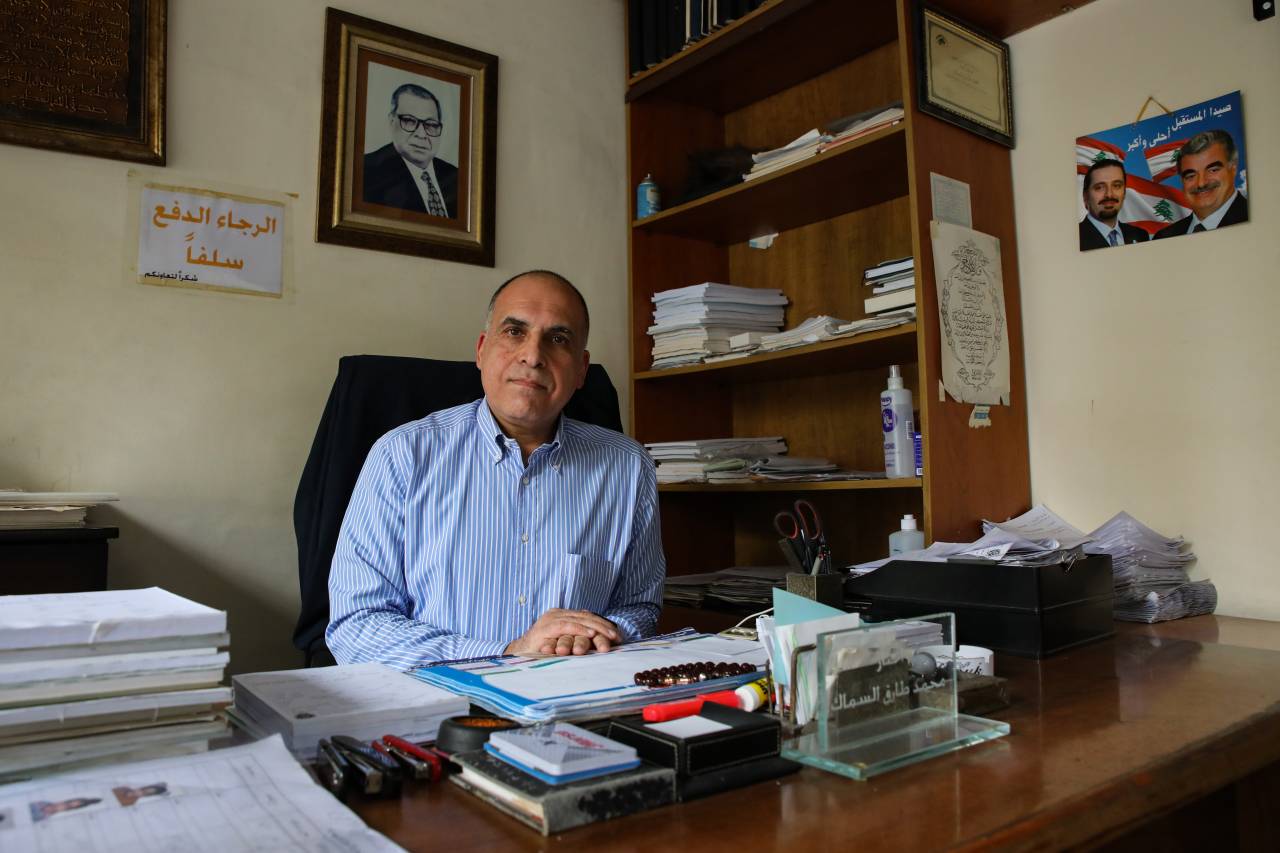 Mohammad Sammak, mukhtar to Tarik Jdide, does not intend to vote. “We have only a pen to oppose to weapons”, says this partisan of the current of the Future.
Mohammad Sammak, mukhtar to Tarik Jdide, does not intend to vote. “We have only a pen to oppose to weapons”, says this partisan of the current of the Future.
“Maalem Mounir.” That’s how he is known in Tariq al-Jadideh. This bodybuilder began working at the age of 10, in Tariq al-Jadideh, near Malaab al-Baladi, where he grew up.
It is here that he made a name for himself. “I am a true Beiruti. I’ve seen everything,” said this former weightlifting champion. The youngsters at the weight-lifting room, where he goes often, envy him. “Their jealousy is going to jinx me one day.”
“Ya mahla el harb [The civil war was easier to live in]. What we’re going through now is much worse,” he said.
“Back then, there was a lot of money out there. If someone’s car got damaged by a shell, he would fix it the next day. Now I do small repairs for LL10,000.”
In his modest workshop, plunged in darkness due to power cuts, his tools are put away. It’s been two weeks since any customer came through the door.
On Oct. 17, 2019, he took to the street in Beirut in protest against the political class. But today, the thawra (revolution) candidates do not convince him. “They can’t even get along, and they want me to trust them,” he said, in reference to the disunification of the opposition lists in the May elections.
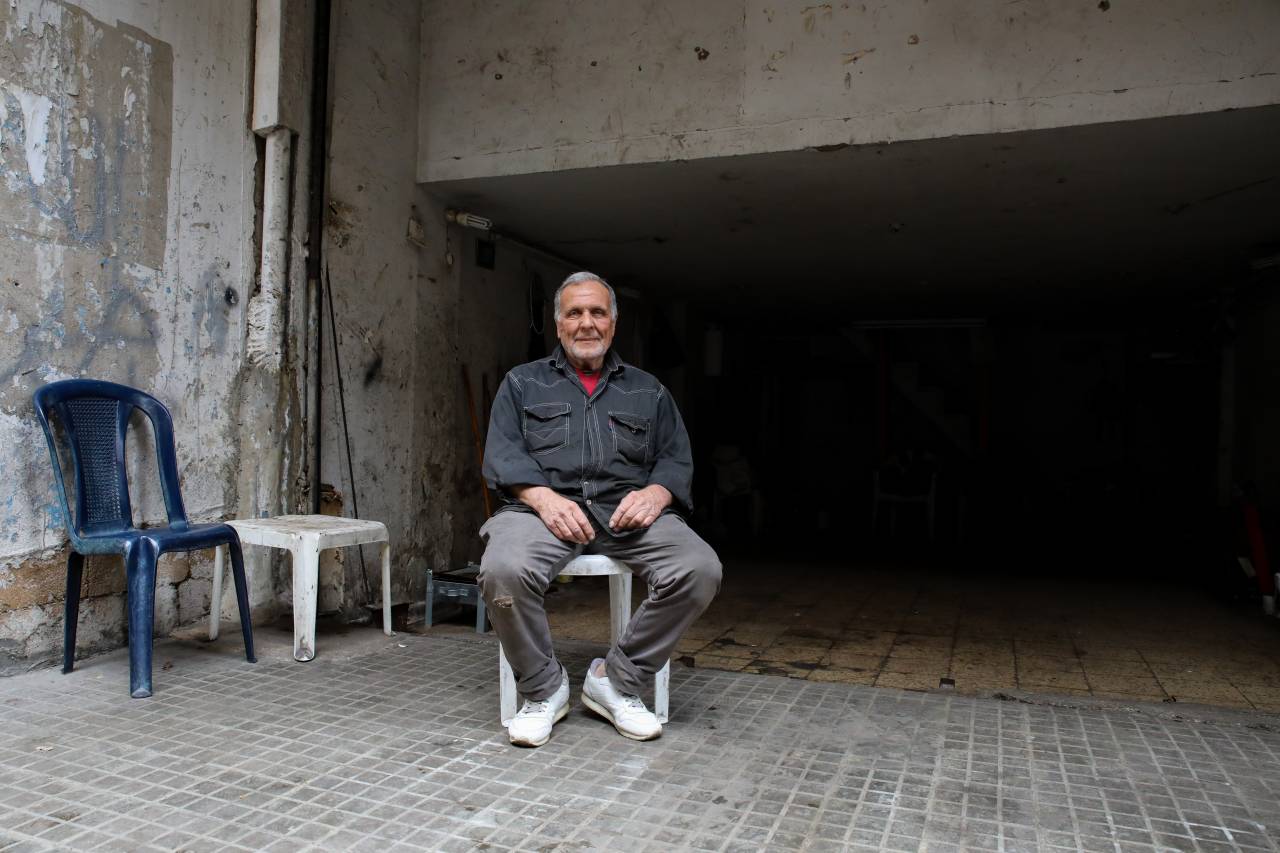 “Saad will come back, right? He must have a plan, ”says Maalem Mounir, a former sympathizer with the Future movement.
“Saad will come back, right? He must have a plan, ”says Maalem Mounir, a former sympathizer with the Future movement.
In 2018, he and his family rushed to the polling station at the last minute, thinking that the March 8 camp (Hezbollah, Amal, Ahbash) could win the elections.
“I voted for Saad Hariri reluctantly. I did it for his father.” In the end, it was the Future Movement’s list that amassed the most seats.
Mounir still does not understand Hariri’s decision to withdraw from politics. A decision that reshuffled all cards in this constituency.
“Saad will come back, right? He must have a plan,” he said. For even if he said he is not sectarian and cites the example of Rafik Hariri who “helped everyone without exception,” the possibility that his constituency’ political color changes scares him.
“The Sunnis are lost. Everything must be done to prevent Hezbollah from winning this year,” said the Maalem, although he does not believe that the elections will actually take place.
‘We already have our own Taliban’
The sound of bells resounds in Barbour. The church, located at the heart of the neighborhood, is surrounded by all kinds of businesses. It recalls the historical presence of the Greek Orthodox, albeit a minority presence, in this land.
Some of them fled during the Civil War. Others stayed, like Michel Saliba. “We are loved here,” the manager of Ahwat Saliba said.
“If you did not pass by here, it means that you have never been to Mazraa,” said Assad Saliba, the co-manager, in his 50s.
Smoke from tobacco products fills the cafe. In the cloud of smoke, there are many wrinkled faces. Ahwat Saliba is the old-timers’ favorite corner. Sitting around a round table with a cigar, a cigarette or with the tip of the hookah between the lips, they play cards, trying, unsuccessfully, not to get too excited.
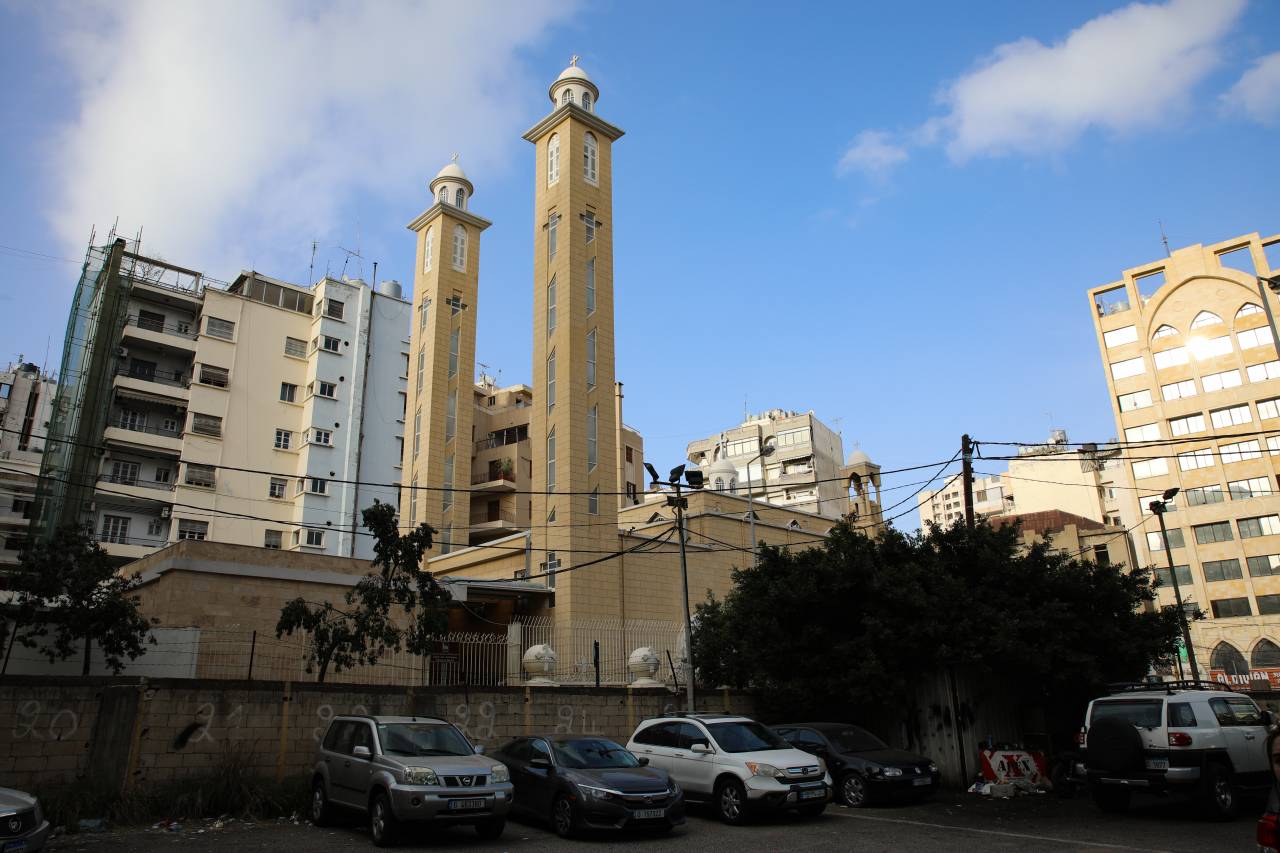 The Greek-Orthodox church, planted in the middle of Mazraa, recalls the historical presence of the Christian minority in this district.
The Greek-Orthodox church, planted in the middle of Mazraa, recalls the historical presence of the Christian minority in this district.
In this cafe that opened more than 70 years ago, nostalgia for the old Beirut prevails. Photos of the city before the war are scattered on the walls, along with a photo of the institution’s founder.
“We all used to know each other here. There were gardens, old buildings, water and electricity around the clock. Now everything is difficult with the crisis, but luckily, I still have a job,” recalled Michel, a 69-year-old accountant.
“The demography has changed here. Before, there was a Sunni majority and we were a Greek Orthodox Christian minority. Now there are the Shiites and Sunnis, and then the Christians,” Assaad said.
He has never missed an election. He usually votes for the Greek Orthodox candidate of the Future Movement. But Hariri’s withdrawal has been a “shock” to him.
In the cafe, Khalid*, a 40 year old, starts to sing. “Tell him to shut up, we can’t hear each other anymore,” Michel told Assaad.
The conversations about the upcoming elections are still in full swing. “Hariri withdrew, he told us to stop, so I’m following the guidelines,” Khalid said. “He joined politics with his money and he is the only one who left it poor.”
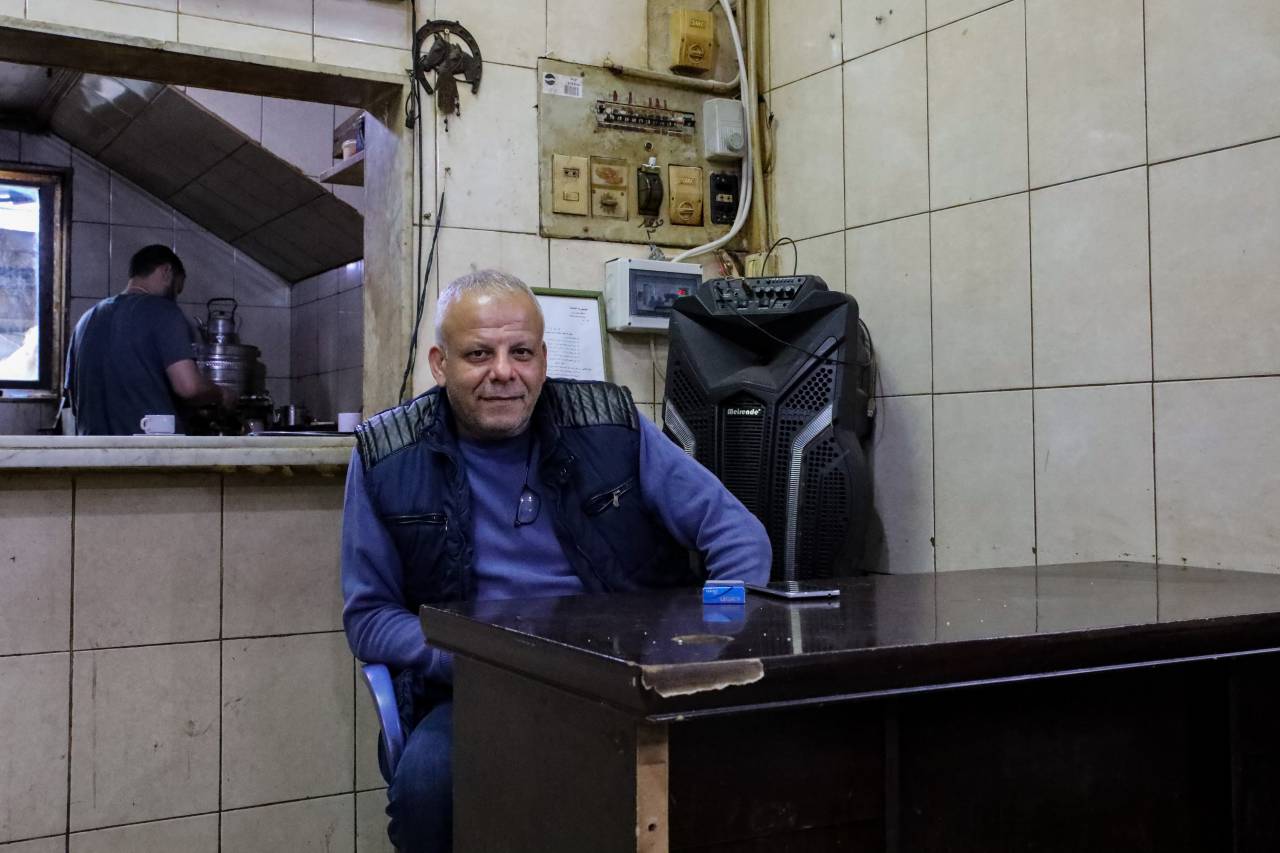 “We have our own Taliban,” says Assaad Saliba, co-manager of Ahwat Saliba, an institution in Mazraa.
“We have our own Taliban,” says Assaad Saliba, co-manager of Ahwat Saliba, an institution in Mazraa.
For these elections, the Saliba family intends to vote for Fouad Makhzoumi’s list, which includes Zeina Majdalani, who hails from a large Greek Orthodox family in Mazraa. “She is one of our relatives, so we will vote for her,” said Michel.
But Assaad does not believe in change. “The decision is not in the hands of the MPs. We know who is in charge of this country. We will end up like Afghanistan. We already have our own Taliban. ”
‘Hezbollah has eaten us’
Corniche el-Mazraa looks like Ali Baba’s caves. The delivery boys on scooters stop for a moment to pray in the Gamal Abdel Nasser Mosque. On the side of the intersection, a beggar carries a toddler, skin and bones, like a bag. Nothing wakes him up. Not even the urban fanfare of honking horns, the squealing tires and roaring engines. Sometimes it’s the sound of bullets that resounds.
“I’m not sectarian, but they force you to be,” Dina, 25, who lives next door said. She is referring to the Shiites, with no exception. She is no longer able to tell the difference. Here, May 7, 2008 — when Hezbollah and its allies took over several neighborhoods in Beirut by force — has left its mark.
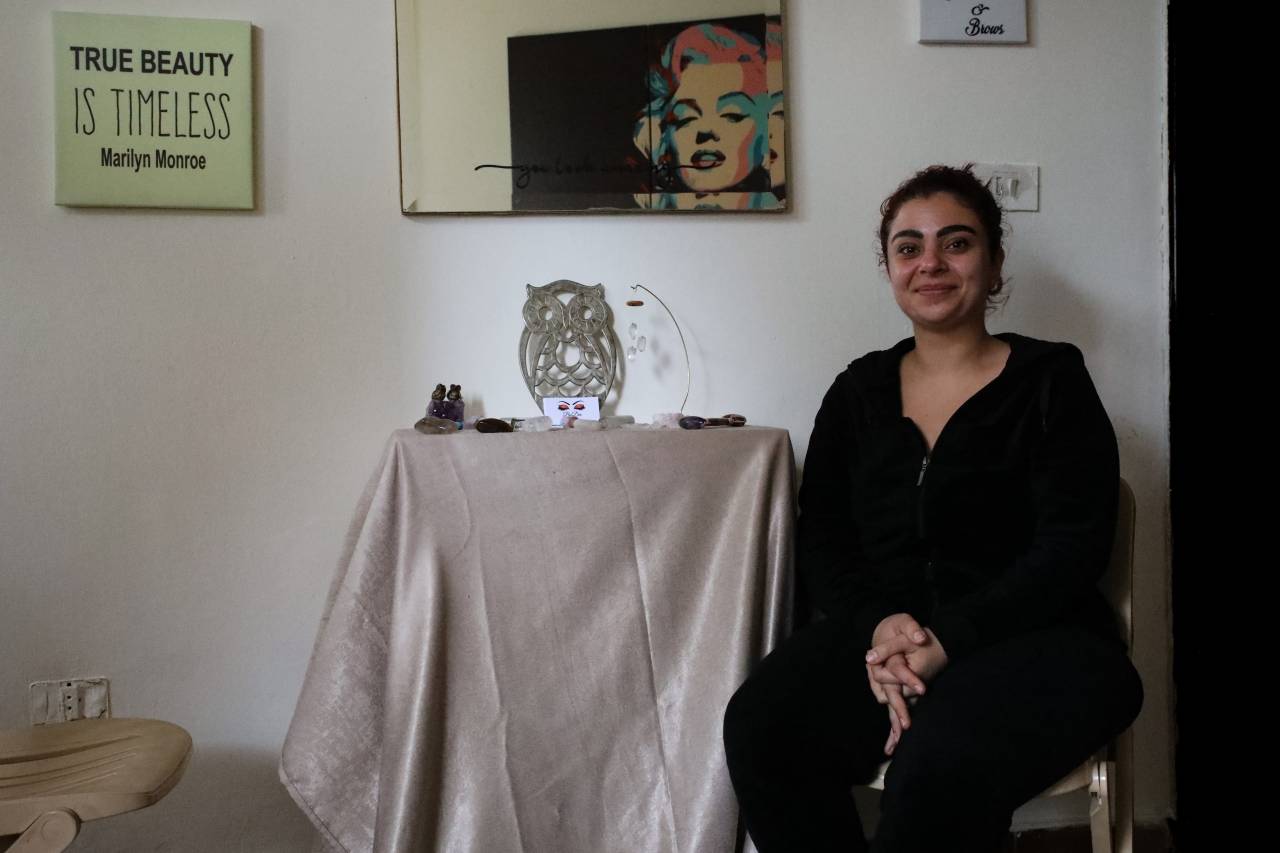 “I’m not sectarian, but they force you to be,” says Dina, who does not intend to vote.
“I’m not sectarian, but they force you to be,” says Dina, who does not intend to vote.
During the thawra, “they came here, broke everything and shot everywhere,” said the young woman, who witnessed the scene from her window. Since that day, her four-year-old daughter has been having panic attacks and screaming when she sees her mother at the window.
Due to health complications, her daughter had to undergo three operations. Dina has to ask her relatives to bring her the necessary medication from abroad.
“I wonder how much longer we can still hold out,” she said before bursting into tears. “I’m 25 years old, and I’ve been on antidepressants since the beginning of the crisis.” Dina feels that her neighborhood has been snatched away from Beiruti families.
“Hezbollah has eaten us, it has armed everyone,” It is not only Hezbollah that she has in her sights. The Palestinians and Syrians too. “All the Lebanese are going to be kicked out. They are the ones who are going to take the country.”
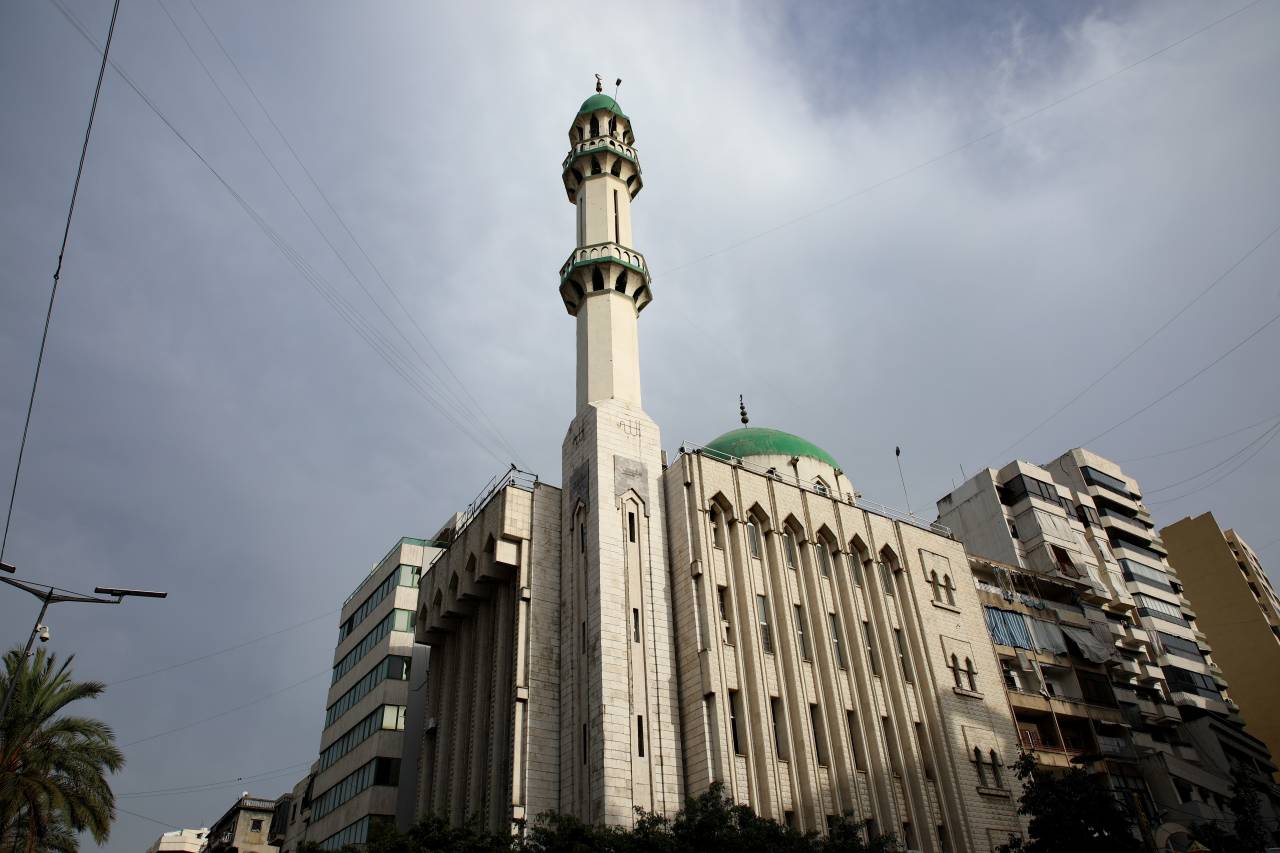 The Jamal Abdel Nasser mosque at Corniche al-Mazraa.
The Jamal Abdel Nasser mosque at Corniche al-Mazraa.
‘Here, Amal controls the street’
In the windows of a series of stores, gold jewelry is on display. In souk el dahab (gold), the few customers who still venture into these shops, once crowded, haggle over prices. Others want to sell their jewelry.
Passers-by slalom between the cars stuck in traffic. With his superhero balloons, Abed, 11, does not go unnoticed. This young Syrian works on the street. “The people are not very nice…” he said. He doesn’t have time to finish his sentence.
Fadi* interrupts the conversation to launch into a tirade against Syrian refugees. “He lives better than I do,” he said. In his hand, the latest mobile phone. As for Abed, he wears only a simple sweater to protect himself from the violent wind.
He lowers his eyes and looks down at his toes sticking out of his sandals. The contour of his lips, which he bites, is completely dry.
The forty-year-old doesn’t even glance at him as he continues his tirade. “They give birth to 10 children and throw two or three of them into the street to die.”
Everything goes into it: the Syrians who live better than the Lebanese, who steal the jobs of the population, and who now outnumber the people… “In two years, they will create a party, take up arms and make a coup d’état, believe me.”
Abed still doesn’t dare to say a word. Fadi was also “thrown” into the street by his parents at the age of 12. “I worked in the buses in Ain el-Mreisseh. I am a self-made man.” Today, he owns a jewelry store. With no employees? He smiles, embarrassed, like a child who has been caught red-handed.
“I have a Syrian employee. For $100 a week, he does everything I want. I could employ a Lebanese but they do not want to work.” he continues his monologue.
This time, it’s the country and the Lebanese who get the blame.“If a war breaks out between Lebanon and Israel, I’ll be with Israel,” said this father of three. This hatred is fueled by the feeling of losing his country which he perceives to be “in the hands of these warlords and zaims.”
For him, Saad Hariri and the Mufti are “no better than the sole of his shoes.” While he dares to insult them, he immediately lowers his voice when talking about Amal and Hezbollah. “Here, Amal controls the street. You need to go through them, even to get power from the neighborhood’s generator.”
‘The Sunnis are to blame’
The flags of Nabih Berri’s party drip onto the lampposts of Ras el-Nabeh. These “ornaments” do not even spare the trees. Amira*, who lives in the area, doesn’t like to call them the “Shiite tandem.” “I am pro-resistance,” said the woman, who participated in the March 8 demonstrations, and who does not perceive with great interest the October 2019 uprising.
“It was nothing,” said this former employee of the Ministry of Telecommunications. But, since the beginning of the crisis that has translated into her retirement being stuck in the banks, she has been “disgusted” by this political class and its game. With one exception: Hassan Nasrallah. She adores him. “His ideology and his logic too.”
From the balcony of Amira’s apartment, “three generations grew up seeing the bombings and conflicts that have shaken the capital,” she said, while sitting in her living room.
For her, May 7 was the Sunnis’ fault. “I saw them from my window, they started it. Anyway, they touched the nerve of the resistance,” she said, in reference to the Fouad Siniora cabinet’s decision, supported by Druze leader Walid Jumblatt, to dismantle Hezbollah’s parallel telecommunications system.
“It is the resistance that allowed us to live in our country and survive,” said this woman, who votes in the Beirut II constituency, although she hails from the South.
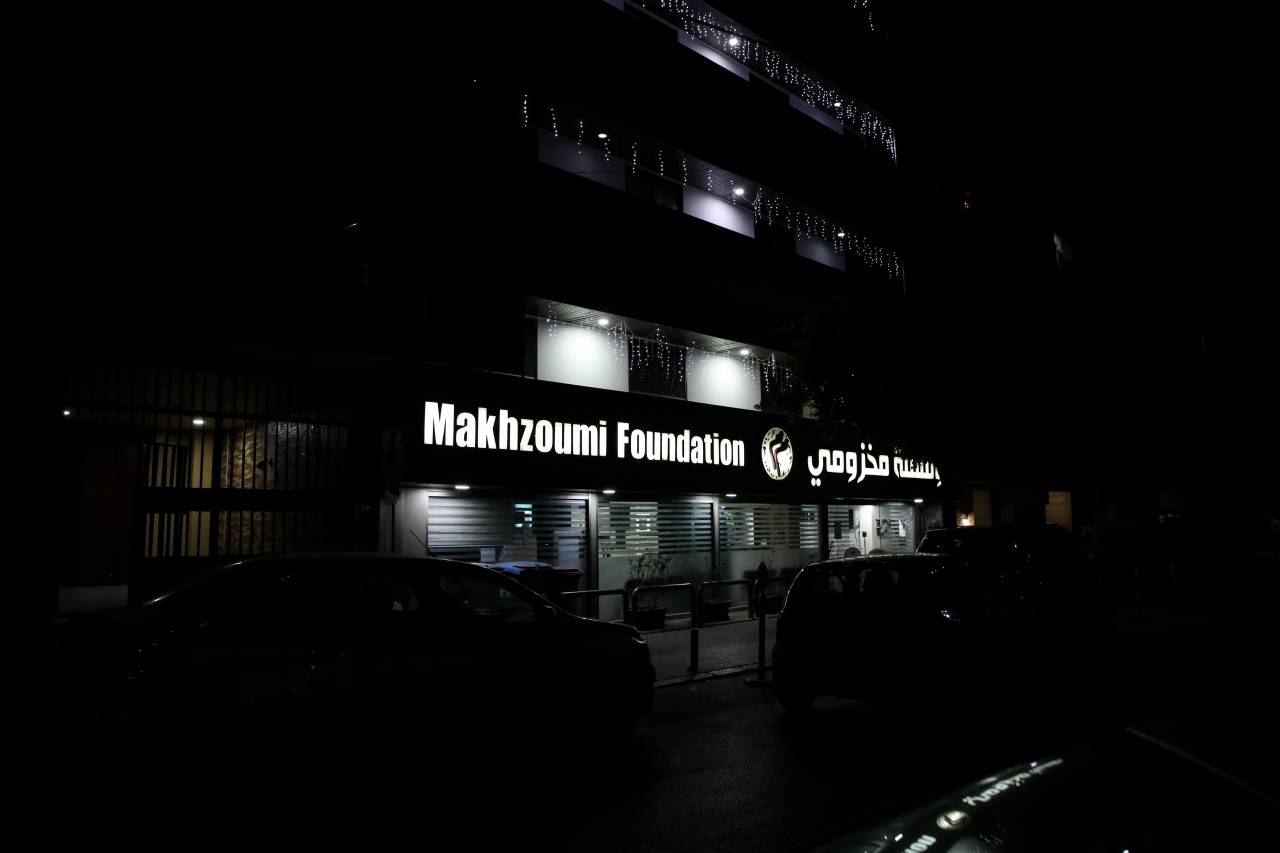 Clientelism is raging in Mazraa on the eve of the legislative elections.
Clientelism is raging in Mazraa on the eve of the legislative elections.
Someone knocks on the door. Her neighbor informs her that the Makhzoumi Foundation is distributing LL750,000 worth of vouchers. “They called me too, but I told them I wasn’t going to vote.”
Although she is not interested in the elections, she made a forecast. “It is true that the Shiites were a minority in the neighborhood, but they are imposing themselves now.”
For her, in the Beirut II constituency, it is Hezbollah’s turn to win the battle. In any case, whether he loses or wins, “Hassan Nasrallah will never give up his arms.”
‘The thawra, an American scheme’
All Walid* wants is a plan for Lebanon’s rescue. “I want a clear program. Today, we feel like the candidates don’t live here. There’s nothing about our standard of living. All we hear are slogans without substance and two discourses: with or against the weapons,” of Hezbollah, said this 78-year-old man in his apartment in Burj Abi Haidar.
His wife, Zahra*, is by his side with her walking stick. She is Sunni. He is Shiite. “We got married for love.” That’s the only time she smiled. Zahra has a heavy look in her eyes. Although the elections are approaching, no candidate has knocked on their door.
Not only has her life changed, but that of her daughter, a teacher, too. The latter had to move in with her parents, along with her child and her husband.
“She helps us with a monthly salary of LL2 million,” said her mother. The medication bill of these parents exceeds LL2 million. Sometimes, it is their son who sends them money. Other times, they find themselves forced to reach out to NGOs.
“Previously, we were the ones helping those in need,” said Ahmad.
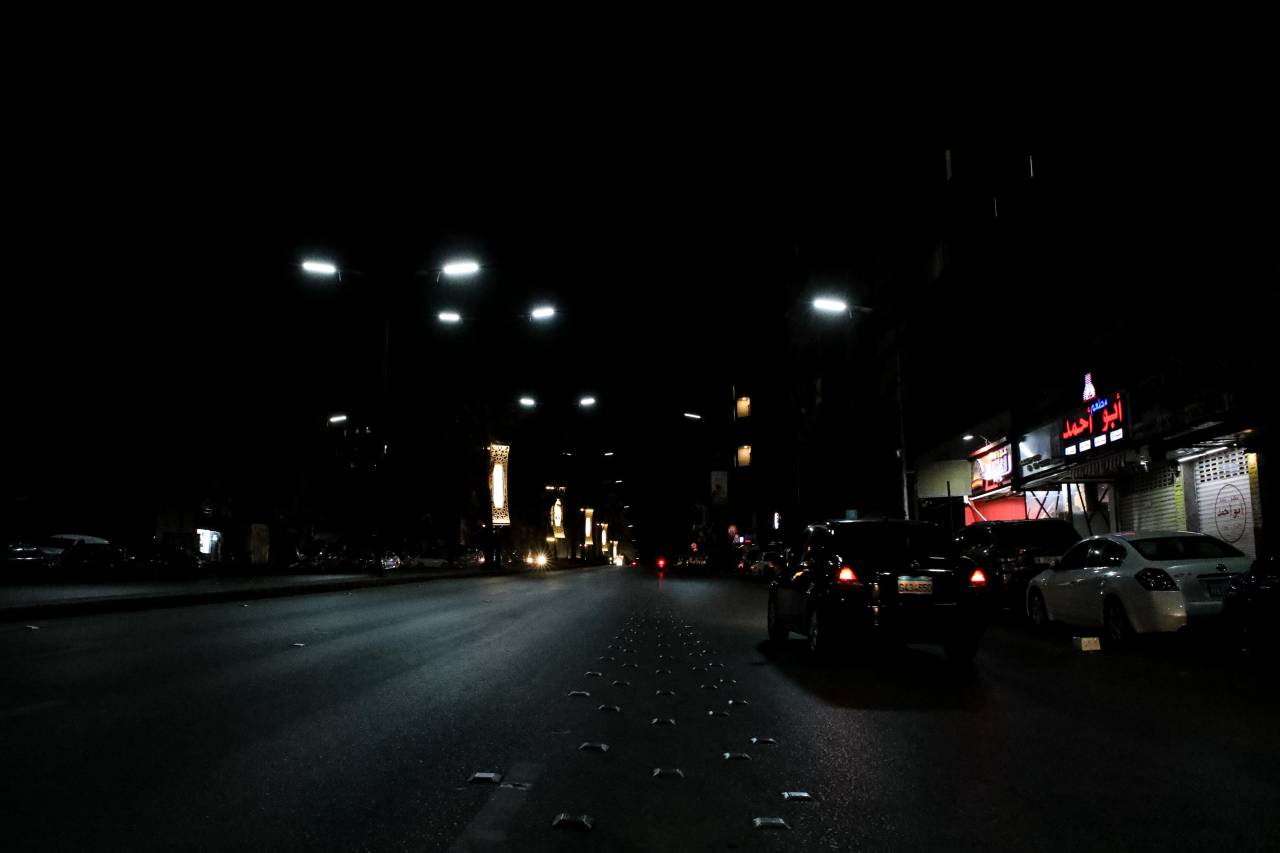 Corniche el-Mazraa is the arena of conflict between supporters of the Future movement and Hezbollah and Amal.
Corniche el-Mazraa is the arena of conflict between supporters of the Future movement and Hezbollah and Amal.
These retired teachers say they are neither with the March 8 nor March 14 camps, but one can tell they are a bit of both when listening to them. They are against the thawra “because it was an American plan,” Zahra said. They are “with the resistance against Israel,” because “one is forced to be when one has lived what I have lived,” explained Walid, originally from the South, who votes in the Beirut II constituency.
Both had cast their ballots for Rafik and Saad Hariri in the past. “We thought that Rafik had a project but the results were not up to the expectations,” said Walid, who added that two of his children were granted a scholarship from Rafik Hariri to study at the AUB.
Today, Walid does not close the door entirely to the elections “We’ll see on election day.” But if no one has a program, his vote will go to Hezbollah.
Lebanon’s music festivals make modest comeback after crisis
Lebanon's international music festivals kicked off at the weekend with a performance in the Roman ruins of Baalbek, the first performance there since the country's economic crisis. At a performance titled Baalbeck Evenings, the return, held as part of the Baalbeck...
Saudi dissident stabbed to death in Lebanon
The founder of a Saudi opposition group has been stabbed to death in a southern suburb of Beirut. Two of Manea Al Yami's brothers were arrested in connection with the incident on Saturday. According to Lebanon's Internal Security Forces, the stabbing took place at...
Prosecutors use prosecutorial discretion to defy laws they find unjust – like abortion ban: The Wake Up for Monday, July 11, 2022
The headlines Discretionary authority: Prosecutors long have used their discretionary authority to let some lesser crimes go to keep caseloads workable while still achieving justice. Now, Robert Higgs reports, there’s a growing trend among progressive prosecutors...
President Biden slams cruelty of Ohio abortion law that forced 10-year-old girl to seek care in Indiana
Rotunda Rumblings Abortion extremes: President Joe Biden on Friday blasted Ohio’s abortion restrictions as he as he signed an executive order aimed at protecting reproductive health care services such as abortion and contraception in the wake of the U.S. Supreme Court...
Social Security benefits: Is extra $200 monthly payment coming?
A bill introduced in Congress by Rep. Peter DeFazio (D-Ore.) and Sen. Bernie Sanders (I-Vt.) would put an additional $200 in the pockets of Social Security beneficiaries. DeFazio and Sanders introduced the Social Security Expansion Act (SSEA) on June 9, according to a...
Elon Musk became father of twins last year, say reports
Elon Musk's latest tweets appear to confirm reports he had twins in late 2021 with Shivon Zilis - an executive at his technology company Neuralink. The Tesla chief executive recently had a second child with on-off partner and electronic artist, Grimes. Reports on...
Security warning after sale of stolen Chinese data
President Xi Jinping has urged public bodies to "defend information security" after a hacker offered to sell stolen data of one billion Chinese citizens. In an advert on a criminal forum, later removed, the user said the data was stolen from Shanghai National Police....
Wall Street Wavers After Surprisingly Strong Jobs Report
Stocks are swinging between small gains and losses as Wall Street works out what to make of surprisingly strong data on the U.S. jobs market released Friday. The S&P 500 was down less than 0.1% in afternoon trading after earlier veering from a loss of 0.9% to a...
Median rent now over $2K nationally; increases seen in Cleveland area but still about half national level
Rents in the Cleveland-area, though increasing, remain almost $1,000 below the national average, according new data released Thursday. by rental tracking website Dwellsy, which noted that nationally the asking rent now tops $2,000. The median asking rents in June...
Banking secrecy law reviewed, central bank’s forensic audit starts, UN calls for government formation
The Finance and Budget Committee began reviewing amendments to the banking secrecy law yesterday, with the committee head saying the review will be completed in 10 days. Amending the banking secrecy law to make it easier to fight corruption and tax evasion, and to...
GameStop shares are about to get much cheaper
GameStop shares will soon lose three quarters of their value. But don't worry: It's good news for stockholders. The company announced Wednesday that its board approved a 4-for-1 stock split, effective July 22. Shares of the meme stock darling soared more than 8% in...
Cuyahoga County, NE Ohio improve to all green for low COVID-19 spread: CDC map for July 7
All Northeast Ohio counties — including Cuyahoga — are green, or designated as having low COVID-19 transmission, on the latest U.S. Centers for Disease Control and Prevention map. Last week, Cuyahoga County and most of Northeast Ohio was yellow, or designated as...
Car racing on Cleveland street hits motorcycle head-on, killing man, woman
A car racing another vehicle on a street in the Slavic Village neighborhood early Thursday morning collided head-on with a motorcycle, killing both the bike’s driver and passenger, police say. Brianca Palmer, 32, of Buffalo, N.Y., a passenger on the 1998 Honda...
21,000 alleged war crimes being investigated of Ukraine War
Ukraine says it is investigating more than 21,000 war crimes and crimes of aggression allegedly committed by Russia since the start of its invasion. Prosecutor General Iryna Venediktova told the BBC she was receiving reports of between 200 to 300 war crimes a day. She...
Hopes for new Italy as disaster trial opens
Four years after Genoa's Ponte Morandi motorway bridge collapsed killing 43 people, a long-awaited trial has begun involving key figures responsible for looking after the structure. Fifty-nine people face a variety of charges including manslaughter and safety...
Sri Lanka president asks Russia’s Vladimir Putin for help to buy fuel
Sri Lanka's president says he has asked Russia's Vladimir Putin to help his cash-strapped nation import fuel, as it faces its worst economic crisis since independence from Britain in 1948. Gotabaya Rajapaksa said he "had a very productive" discussion with Mr Putin. It...
Rights groups object to Lebanon plans to forcibly repatriate Syrian refugees
The UN and human rights groups have raised objections over Lebanon’s plan to repatriate Syrian refugees at a rate of 15,000 a month. The plan will be implemented “regardless of UNHCR’s position”,― caretaker Minister of the Displaced Issam Charaffedine said on...
Lebanon averts nationwide blackout by paying part of debt
An overnight nationwide blackout of state electricity in Lebanon was averted after Lebanese authorities paid off some of the debt it owes to the operator of the country’s only functioning power plants. On Wednesday,Lebanon's state electricity company announced that...
Shots fired as crowd watches fireworks on Cleveland’s West Side, killing 1, wounding 2
A 24-year-old man was killed and two people were wounded after shots were fired while a large crowd watched a fireworks display on the city’s West Side, police say. Arnold Hoyle of Cleveland died of his wounds at MetroHealth Medical Center after he was wounded in the...
Powerball winning numbers for Wednesday, July 6, 2022; jackpot $35 million
The Powerball lottery held its drawing on Wednesday, July 6, 2022, for a jackpot estimated at $35 million. The winning numbers are 32-36-49-62-69 Powerball 13 Power Play 2x. The Classic Lotto numbers are 16-24-25-33-38-49 Kicker 248342. The jackpot is $31 million for...
Submit your event
We will be happy to share your events. Please email us the details and pictures at publish@profilenewsohio.com
Address
P.O. Box: 311001 Independance, Ohio, 44131
Call Us
+1 (216) 269 3272
Email Us
Publish@profilenewsohio.com

